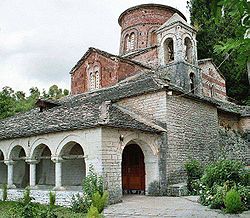
Albania constitutionally is a secular country, and as such, “neutral in questions of belief and conscience”. The most common religions practiced in Albania are secular Islam, Agnosticism and Christianity. According to 2013 results, 38% of Albania adheres to secular/non practising Islam, making it the largest single religion in the country. The majority of Albanian Muslims are secular Sunni with a significant Bektashi Shia minority. Christianity is practiced by 35% of the population, making it the 2nd largest religion in the country. The remaining population is either irreligious or belongs to other religious groups. In a census performed before World War II, a rough distribution of population was 70% Muslims, 20% Eastern Orthodox, and 10% Roman Catholics. Majority of Albanian’s had been Greek Orthodox prior to Ottoman Invasion of the Balkans.
In 1967, religious practices were officially banned in Albania, making the country the first and only constitutionally atheist state to ever exist. After the fall of state communism, in 1991 religious activities resumed. Among people who follow any of the four major religions in Albania, there is a mixture of various religious traditions and pagan traditions coming from the time before Christianity. The Orthodox percentage reported might be lower than the actual value due to boycotts of the census, but also because the census staff failed to contact a very large number of people in the south which is traditionally an Orthodox stronghold. There were other serious allegations about the conduct of the census workers that might have impacted on the 2011 census results. There were some reported cases where workers filled out the questionnaire about religion without even asking the participants or that the workers used pencils which were not allowed.
However, even among those who declared a religion, the majority of the population in Albania has a more secular interpretation of religion than would be found in other countries. An August 2012, a Pew Research study found out that only 5-10% of the Muslim population for example, consider religion as a very important factor in their lives, which was the lowest percentage in the world amongst countries with significant Muslim populations. Another survey conducted by Gallup Global Reports 2010 shows that religion plays a role to 25-39% of Albanians, and lists Albania as the thirteenth least religious country in the world.
The Constitution provides for freedom of religion, and the Government declares that it generally respect this right. The Government declares its secularism. There is no official religion and all religions are equal; however, the predominant religious communities (Sunni Muslim, Bektashi, Orthodox, and Catholic) enjoy a greater degree of official recognition (e.g., national holidays) and social status based on their historical presence in the country. Official holidays include holy days from all four predominant faiths.
All registered religious groups have the right to hold bank accounts and to own property and buildings. No restriction is imposed on families regarding the way they raise their children with respect to religious practices. The generally amicable relationship among religions in society contributed to religious freedom.
Licensing
The Government doesn’t require registration or licensing of religious groups; however, the State Committee on Cults maintains records and statistics on foreign religious organizations that contact it for assistance. No groups reported difficulties registering during the period covered by this report. All registered religious groups have the right to hold bank accounts and own property. Religious movements may acquire the official status of a juridical person by registering with the Tirana District Court under the Law on Nonprofit Organizations, which recognizes the status of a nonprofit association regardless of whether the organization has a cultural, recreational, religious, or humanitarian character. All religious communities have criticized the Government for its unwillingness to grant them tax-exempt status. Since 2003 foreign religious missionaries have been exempt from the residence permit tax.
The State Committee on Cults, under the jurisdiction of the Ministry of Tourism, Culture, Youth, and Sports, is charged with regulating relations between the Government and all religious communities as well as protecting freedom of religion and promoting interreligious cooperation and understanding. The committee claims that its records on religious organizations facilitate the granting of residence permits by police to foreign employees of various religious organizations. No organization claimed any difficulty in obtaining residency permits during the period covered by this report. However, as a general rule, foreign religious missionaries were issued only 1-year residency permits instead of the 5-year permits allowed by law for residents in the country more than 2 years. During the period covered by this report, the Committee began working with the Government on criteria that would allow longer-term residency permits of up to 5 years for well-established religious organizations with long-term ties to the country.
There is no law or regulation forcing religious organizations to notify the Committee of their activities; however, article 10 of the Constitution calls for separate bilateral agreements to regulate relations between the Government and religious communities. The Catholic Church continued to be the only religious community that had finalized such an agreement with the Government. The Committee had a mandate to negotiate agreements with the three remaining groups and created a working group in May 2006 for this purpose. The Committee reportedly reached an agreement with three groups—the Muslim, Orthodox, and Muslim Bektashi communities. VUSH, a Protestant umbrella organization, approached the Committee to negotiate a bilateral agreement but had not received a response by the end of the reporting period.